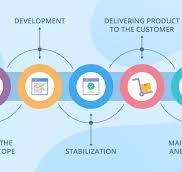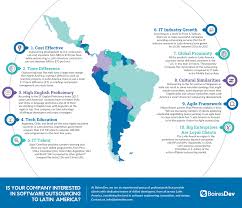Unlocking the Power of Agile Beyond Software Development
The Agile Approach: Not Just for Software Development
Agile methodology, originally designed for software development, has proven to be a versatile and effective approach that can be applied beyond the realm of coding. While its roots lie in the tech industry, agile principles have found success in various fields, including marketing, project management, and even personal productivity.
Adaptability and Collaboration
At its core, agile emphasizes adaptability and collaboration. These principles can benefit any team or individual looking to improve efficiency and effectiveness in their work processes. By breaking down projects into smaller tasks or iterations, teams can quickly respond to changes and feedback, ensuring that they stay on track towards their goals.
Agile in Marketing
In marketing, agile methodologies are increasingly being adopted to enhance campaign planning and execution. By prioritizing tasks based on customer feedback and market trends, marketers can create more targeted and impactful campaigns that resonate with their audience.
Agile Project Management
Project managers are also embracing agile practices to streamline project workflows and improve team collaboration. By using tools like Kanban boards and daily stand-up meetings, project teams can stay organized, communicate effectively, and deliver results more efficiently.
Benefits of Agile Outside Software Development
The benefits of adopting agile methodologies extend beyond software development. Teams that implement agile practices often experience:
- Rapid adaptation to changing requirements
- Improved communication and transparency
- Increased productivity and efficiency
- Better alignment with customer needs
Conclusion
As the business landscape continues to evolve rapidly, the agile approach offers a flexible and collaborative framework for success across various industries. By embracing agility in their work processes, individuals and teams can navigate challenges more effectively and achieve better outcomes in today’s dynamic environment.
Exploring Agile Beyond Software: FAQs on Applying Agile Principles in Various Fields
- How can agile principles be applied outside of software development?
- What are the benefits of using agile methodologies in non-software contexts?
- How can agile help in marketing strategies?
- What tools are commonly used to implement agile practices outside of software development?
- How does agile project management differ from traditional project management?
- Can individuals benefit from applying agile principles in their personal tasks or projects?
How can agile principles be applied outside of software development?
Agile principles, originally developed for software development, can be effectively applied outside of the tech industry to enhance productivity and collaboration in various fields. By breaking down tasks into smaller iterations, prioritizing customer feedback, and fostering a culture of adaptability and continuous improvement, agile methodologies can streamline processes in marketing, project management, and other areas. Embracing agile principles outside of software development enables teams to respond quickly to changes, improve communication, and deliver results more efficiently, ultimately leading to better outcomes and increased success in diverse industries.
What are the benefits of using agile methodologies in non-software contexts?
In non-software contexts, the benefits of using agile methodologies are significant. Agile principles promote adaptability, collaboration, and rapid response to changes, which can enhance productivity and efficiency in various industries. By breaking down projects into manageable tasks and iterations, teams can better prioritize work, align with customer needs, and improve communication among team members. The flexibility of agile methodologies allows teams to quickly adjust to shifting requirements and market conditions, leading to better outcomes and increased success in non-software environments.
How can agile help in marketing strategies?
Agile methodology can significantly benefit marketing strategies by providing a framework that emphasizes adaptability, collaboration, and customer-centricity. In the realm of marketing, agile practices enable teams to respond quickly to changing market trends and customer feedback, allowing for the creation of more targeted and impactful campaigns. By breaking down marketing initiatives into smaller tasks or iterations, teams can prioritize efforts based on real-time data and insights, resulting in more effective strategies that resonate with their target audience. Ultimately, agile empowers marketers to be more responsive, innovative, and customer-focused in their approach to campaign planning and execution.
What tools are commonly used to implement agile practices outside of software development?
In non-software contexts, various tools are commonly utilized to implement agile practices effectively. For project management, tools like Kanban boards, task boards, and daily stand-up meetings help teams visualize workflows, track progress, and foster collaboration. Additionally, techniques such as user stories and sprint planning sessions are valuable for setting clear goals and priorities. Tools like Trello, Asana, Jira, and Monday.com are popular choices for managing tasks and projects in an agile manner outside of software development. These tools facilitate communication, transparency, and adaptability, enabling teams to embrace agile principles and achieve success in their endeavors.
How does agile project management differ from traditional project management?
In the realm of project management, the key distinction between agile and traditional approaches lies in their methodologies and mindset. Agile project management emphasizes flexibility, adaptability, and collaboration over rigid planning and documentation. Unlike traditional project management methods that follow a linear, sequential process, agile embraces an iterative approach where projects are broken down into smaller tasks or sprints. This allows teams to respond quickly to changes, gather feedback from stakeholders, and make adjustments as needed throughout the project lifecycle. By fostering continuous communication and delivering incremental value, agile project management promotes a more dynamic and customer-focused way of working that is well-suited for today’s fast-paced business environment.
Can individuals benefit from applying agile principles in their personal tasks or projects?
Individuals can indeed benefit significantly from applying agile principles to their personal tasks or projects. By breaking down larger goals into smaller, manageable tasks or iterations, individuals can maintain focus, adapt to changes more easily, and track progress effectively. Prioritizing tasks based on importance and feedback allows for a more efficient use of time and resources. Additionally, regular reflection and adjustment help individuals stay on course towards their objectives while fostering a sense of accountability and continuous improvement in their personal endeavors.










